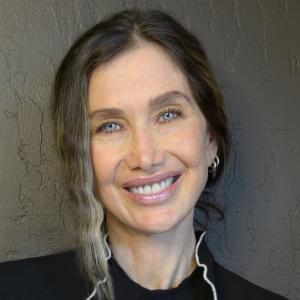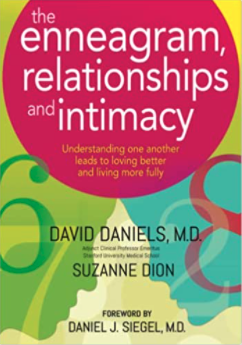It’s Our Relationship to Ourselves That Makes or Breaks Our Relationships With Others — the Enneagram Can Make a Difference
By Suzanne Dion
 We are living in a very interesting, very fascinating time. Gender is up for discussion even obliteration, divorce is somewhat expected, nurture-dependent infants are left in daycare as early as six-weeks old — the potential for developmental neglect nationally normalized, technology has far surpassed our wildest dreams and so many of us struggle to find a partner who can meet our needs, who can “make us happy.” The level of disenchantment across our world is incredibly high as well as the level of progress, advancement, and fascination too.
We are living in a very interesting, very fascinating time. Gender is up for discussion even obliteration, divorce is somewhat expected, nurture-dependent infants are left in daycare as early as six-weeks old — the potential for developmental neglect nationally normalized, technology has far surpassed our wildest dreams and so many of us struggle to find a partner who can meet our needs, who can “make us happy.” The level of disenchantment across our world is incredibly high as well as the level of progress, advancement, and fascination too.
Today, couples are struggling to stay together let alone stay in love. Making a living in the midst of a recent pandemic — keeping our families and our savings from dissolving — has just about maxed out the very best of us.
As we seek to make sense of it all, how we get along with others seems to come up over and over again as we look for happiness. Our relationships are what seem, each time, to be at the center of the joy we often experience. There’s no doubt relationships affect how connected we feel to ourselves as well as to what creates meaning in our lives. And, there’s no doubt they seem to be the number-one cause of the greatest suffering in our lives as well, over and over again. At the center of much unhappiness, conflict, and despair even, our inability to relate to one another lovingly, our inability to communicate with one another honestly or effectively, and our inability to manage our emotional upheaval and reactivity are at the very heart of so many of our lifelong struggles.
Is our strive-and-surpass, me-first, go-getter driven American society actually in line with our fundamental human structure and most basic of emotional needs? It’s a good question. Because, we actually really need each other. We weren’t designed to be alone, swimming isolated in riches. It’s that simple. We need each other and we need relationships, all kinds of relationships. We do not fully develop, embody, or expand our ‘sense of self’, without them. Research tells us that we are social creatures with a social brain. This means we are co-regulatory and interpersonally connected, stunningly interdependent, and wired to belong in order to not only survive but hopefully thrive — and to experience ourselves innocently and authentically, and develop fully.
A social brain is a “relationships brain.” And it begins the very moment we are born. Our first attachments are our first love stories. To understand our lives we need to understand our relationships — their importance, their quality, and the critical role they play in shaping our minds and hearts, our narratives and our becoming.
There is nothing more important to human life than two very simple things:
- Our relationship with ourselves
- Our relationships with others
Our relationship to ourselves is where we begin. As paradoxically, it's our relationship to ourselves that determines the kind of relationships we will allow, engender, and cultivate with others. Understanding ourselves is what leads to understanding others. Intimacy with ourselves first determines our capacity for true and lasting intimacy with any and all others — psychologically, emotionally, physically, and spiritually.
How do we actually develop a relationship with ourselves? This might seem to some a very silly question because, isn’t it already a given? “I talk to myself all the time!” someone once shared. So, let’s reword the question. How do we develop a quality, intimate relationship with ourselves? Quality and intimate meaning the kind of relationship that yields an authentic, felt-experience of our cognitive-emotional inner world, of the truth of our innermost being-ness, and our acceptance of it.
The answer I’d like to offer up: We study “the Enneagram.” The Enneagram is a body of wisdom that helps us recognize and then learn about ourselves, from the inside out. The Enneagram gives us permission to learn about ourselves in a way that is de-shaming and profoundly empowering. “Oh, that’s why I express anger that way!” “OH WOW, that’s why I believe I have to be so strong, so prepared, so easy-going, so perfect, so special, so smart, so fun, so…, so…, so… to be loved.” The Enneagram is a system that takes us to the core of understanding our personality’s (temperamental) structure — its patterns, core beliefs, and propensities. Understanding “how we’re wired” to either ensure that we are loved and connected or that we’re safe and protected, we can truly and more intimately come to know ourselves — and then grow! And as we come to know and understand ourselves, another great benefit becomes attainable: Self-mastery. We can begin to free ourselves from the on-automatic, habitual cognitive-emotional perceptions and behaviors that may be interfering with how good or bad we feel about ourselves and our lives, how well we can possibly get along with others, and how fully we actually love (and allow ourselves to be loved). What we’ll tend to find is that these on-automatic patterns — particularly our unmanaged emotional reactivity and defendedness, are at the center of much of our relational upheaval, fear, grief, and dissatisfaction.
So, this is where we begin, and we must begin with ourselves. A commitment to knowing ourselves from the inside out is a noble, so-worthwhile, life-enhancing, “my development is my gift to me!” pursuit. We can begin by studying the Enneagram, as its wisdom is so kind, so de-shaming, so talents and gifts illuminating, and so vastly incisive.
The foundation of this pursuit is self-awareness. The method at all times is curiosity. The mantra at each stage is self- and other-acceptance. And the outcome is a truly intimate, quality relationship with ourselves and truly intimate, quality relationships with each and every special other in our lives.
I began studying the Enneagram some 20 years ago by pure providence, and what a lucky woman I truly I am to have discovered it. Thanks to the Shift Network and creative developer and Enneagram teacher Jessica Dibb, The Enneagram Global Summit is made possible and is now in its 8th year! Take advantage of five days of online presentations featuring over 70 of the world’s leading teachers and innovators of the modern Enneagram. What an extraordinary opportunity it truly is. Begin the “relationship with self” journey today! See you at the 2021 Enneagram Global Summit, December 6-10.
 Suzanne Dion certified in 2008 as an Enneagram teacher in the narrative tradition, having stumbled upon the Enneagram by some force of “divine luck,” (and thanks to David Daniels, MD). She then went on to teaching, coaching, marketing and writing about the Enneagram, as well as working closely with David and his Enneagram-based organizations. David and Suzanne co-authored the book The Enneagram, Relationships and Intimacy: Understanding One Another Leads to Loving Better and Living More Fully. This heartfelt project was something David was tirelessly devoted to — he and Suzanne had been working on it for nearly 7 years at the time of David's passing in 2017. It was finally published in late 2018.
Suzanne Dion certified in 2008 as an Enneagram teacher in the narrative tradition, having stumbled upon the Enneagram by some force of “divine luck,” (and thanks to David Daniels, MD). She then went on to teaching, coaching, marketing and writing about the Enneagram, as well as working closely with David and his Enneagram-based organizations. David and Suzanne co-authored the book The Enneagram, Relationships and Intimacy: Understanding One Another Leads to Loving Better and Living More Fully. This heartfelt project was something David was tirelessly devoted to — he and Suzanne had been working on it for nearly 7 years at the time of David's passing in 2017. It was finally published in late 2018.
Suzanne is now committed to bringing the Enneagram to others interested in increasing self-knowing and decreasing intrapersonal suffering. She is particularly focused on the losses suffered as a result of childhood trauma, and how those experiences are organized and dealt with by each Enneagram type. Our "nature" as impacted by our "nurture" is what shows up for us as we set out to form relationships — the one we have with ourselves first, then the relationships we'll develop with others.
Suzanne holds a huge place in her heart for those who are incarcerated, struggling once released from prison or a treatment center, or suffering relational, marital, or personal sabotage. As one of the original founding board members and teachers for Enneagram Prison Project (EPP), Suzanne remains dedicated to bringing the Enneagram to those who may not necessarily seek it out on their own, but who so deserve the same chance she was given to learn this valuable map of self-and-other understanding. Particularly interested in marginalized women and their families, Suzanne's currently working to develop a training program for the young mothers and fathers of the world, as an understanding of the Enneagram early on can make such a profound difference — to couples and their intimate relationship, to understanding one's self as a parent, and to building better, more successful relationships with our developing children.
Catalyst is produced by The Shift Network to feature inspiring stories and provide information to help shift consciousness and take practical action. To receive Catalyst twice a month, sign up here.
This article appears in: 2021 Catalyst, Issue 20 - Enneagram Global Summit



